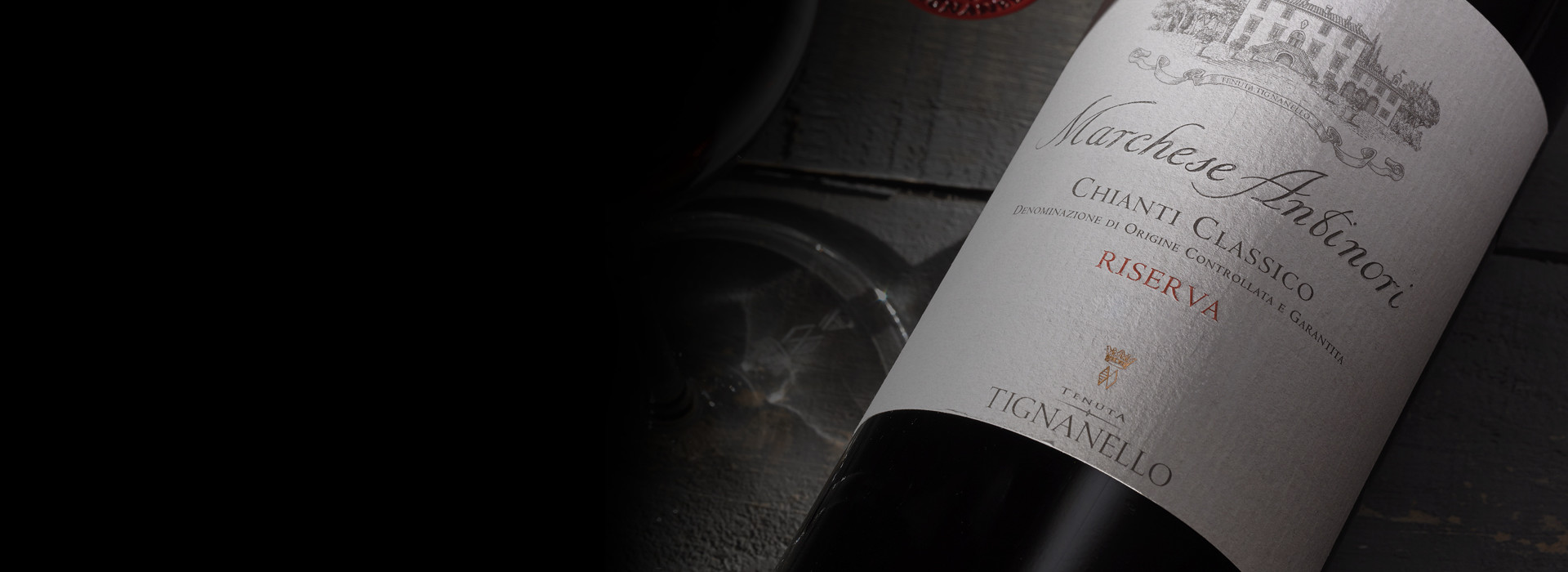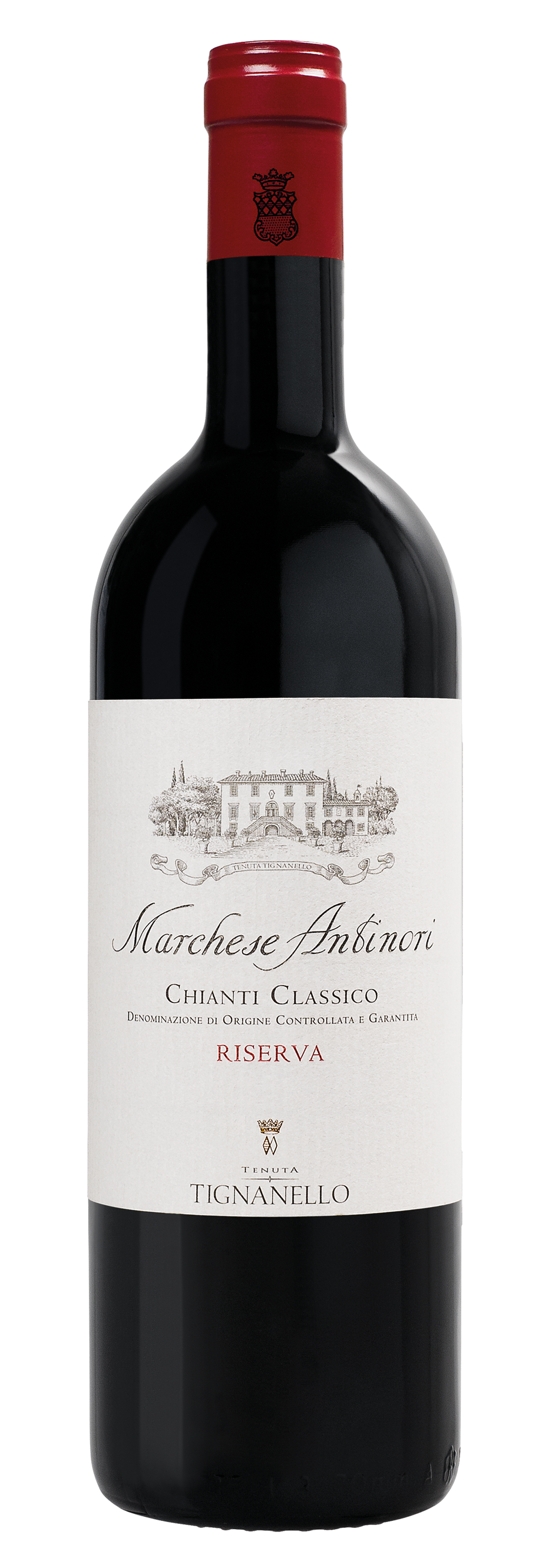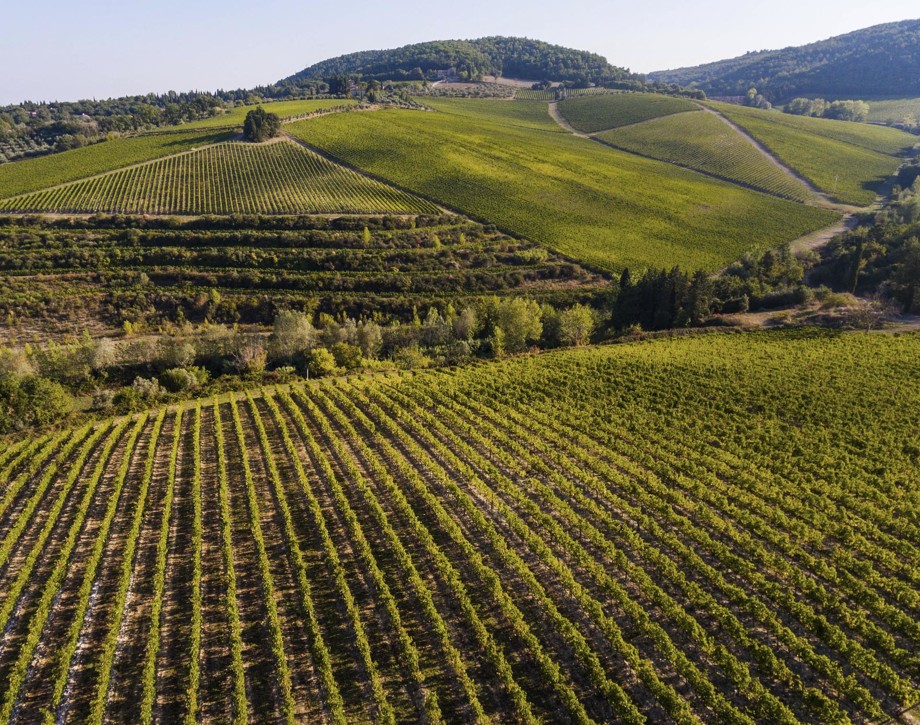Marchese Antinori

Climate
The 2018 growing season in Chianti Classico began with normal winter weather both in terms of temperatures and rainfall. Despite these climatic conditions, the vines began bud break a week earlier than seasonal averages in this area. Spring was characterized by frequent rain showers and lower than average temperatures, especially during the month of May, while June and July were hot and dry uninterrupted by extreme heat events. Scattered rainfall in the month of August and a dry, breezy spell in September and October allowed the grapes to progress to perfect ripeness guaranteeing excellent sugar levels and polyphenolic maturity. Harvest activities began mid-September with Sangiovese and was completed in the first half of October with Cabernet.
Vinification
Upon arrival in the cellar, the clusters were destemmed and gently crushed: the must was transferred into stainless steel vats where alcoholic fermentation occurred in about one week’s time. Maceration on the skins was managed with gentle pump overs and délestage (rack and return) for an intense extraction while preserving elegant and supple tannins. Malolactic fermentation, which took place spontaneously, was completed by the end of the year. The wine was then blended and went into French and Hungarian oak barriques for approximately one year. Marchese Antinori Riserva was bottled and then aged in the bottle for an additional twelve-month period before being released.
Historical Data
The Tignanello estate is located in the heart of the Chianti Classico production zone, nestled between the valleys of the Greve and Pesa rivers, and extends over close to 800 total acres (319 hectares), some 130 of which (415 hectares) are planted to vines. The vineyards consist principally of the native Sangiovese grape along with such non-traditional varieties as Cabernet Sauvignon and Cabernet Franc. The Marchese Antinori is an historic wine of the Antinori cellars which, since 2011, is produced from the grapes of the Tignanello estate. It is a wine which presents itself as the full expression of the quality and elegance of the Sangiovese of this part of Tuscany.
Tasting Notes
Marchese Antinori is ruby red in color. On the nose intense notes of morello cherries, violets and lavender and slight sensations of iron typical of Sangiovese and spicy notes of tobacco and leather; its bouquet is completed by delicate hints of vanilla and cocoa powder. Its palate is mouth-filling, generous and lively with an excellent compact tannins that give it a lengthy persistent finish. Exceptional aftertaste characterized by red fruit and licorice.

The Wine
This Antinori family’s historic label, since the 2011 vintage Marchese Antinori has been produced with grapes exclusively from the Tignanello vineyard. It’s made almost entirely with Sangiovese with a small percentage of other complementary varieties. A wine that fully expresses the quality and elegance of Sangiovese grapes grown in this area.

Climate
The 2018 growing season in Chianti Classico began with normal winter weather both in terms of temperatures and rainfall. Despite these climatic conditions, the vines began bud break a week earlier than seasonal averages in this area. Spring was characterized by frequent rain showers and lower than average temperatures, especially during the month of May, while June and July were hot and dry uninterrupted by extreme heat events. Scattered rainfall in the month of August and a dry, breezy spell in September and October allowed the grapes to progress to perfect ripeness guaranteeing excellent sugar levels and polyphenolic maturity. Harvest activities began mid-September with Sangiovese and was completed in the first half of October with Cabernet.
Vinification
Upon arrival in the cellar, the clusters were destemmed and gently crushed: the must was transferred into stainless steel vats where alcoholic fermentation occurred in about one week’s time. Maceration on the skins was managed with gentle pump overs and délestage (rack and return) for an intense extraction while preserving elegant and supple tannins. Malolactic fermentation, which took place spontaneously, was completed by the end of the year. The wine was then blended and went into French and Hungarian oak barriques for approximately one year. Marchese Antinori Riserva was bottled and then aged in the bottle for an additional twelve-month period before being released.
Historical Data
The Tignanello estate is located in the heart of the Chianti Classico production zone, nestled between the valleys of the Greve and Pesa rivers, and extends over close to 800 total acres (319 hectares), some 130 of which (415 hectares) are planted to vines. The vineyards consist principally of the native Sangiovese grape along with such non-traditional varieties as Cabernet Sauvignon and Cabernet Franc. The Marchese Antinori is an historic wine of the Antinori cellars which, since 2011, is produced from the grapes of the Tignanello estate. It is a wine which presents itself as the full expression of the quality and elegance of the Sangiovese of this part of Tuscany.
Tasting Notes
Marchese Antinori is ruby red in color. On the nose intense notes of morello cherries, violets and lavender and slight sensations of iron typical of Sangiovese and spicy notes of tobacco and leather; its bouquet is completed by delicate hints of vanilla and cocoa powder. Its palate is mouth-filling, generous and lively with an excellent compact tannins that give it a lengthy persistent finish. Exceptional aftertaste characterized by red fruit and licorice.

Tenuta Tignanello
The Tenuta Tignanello estate is in the heart of Chianti Classico, in the gently rolling hillsides between the Greve and Pesa river valleys. It extends over an area of 319 hectares (788 acres), of which about 165 (407 acres) are dedicated to vines. Two of the estate’s prized vineyards are on the same hillside, Tignanello and Solaia, on soils that originated from marine marlstone from the Pliocene period rich in limestone and schist.
Soil
Calcareous rocky soils with alberese (marl limestone) and marl.


















